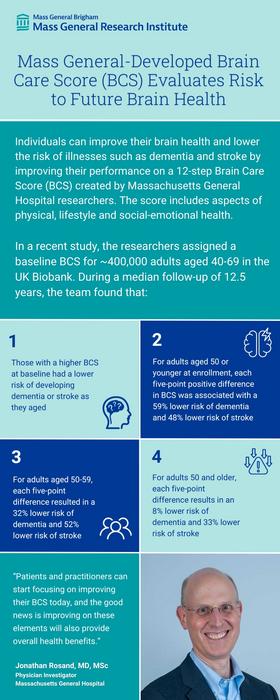BOSTON – Individuals can improve their brain care and reduce their risk of developing brain diseases such as dementia and stroke by focusing on a list of 12 steps covering modifiable physical, lifestyle, and social-emotional components of health.
The list was developed and validated in research published in Frontiers in Neurology by investigators from the McCance Center for Brain Health at Massachusetts General Hospital (MGH) and their collaborators in the United States and Europe.
For the study, the scientists derived a baseline Brain Care Score (BCS) at the start of enrollment for 398,990 adults aged 40–69 years in the UK Biobank.
Physical components of the brain score relate to blood pressure, blood sugar, cholesterol and body mass index.

Credit: Always credit the Mass General Research Institute when utilizing the infographic
BOSTON – Individuals can improve their brain care and reduce their risk of developing brain diseases such as dementia and stroke by focusing on a list of 12 steps covering modifiable physical, lifestyle, and social-emotional components of health.
The list was developed and validated in research published in Frontiers in Neurology by investigators from the McCance Center for Brain Health at Massachusetts General Hospital (MGH) and their collaborators in the United States and Europe.
For the study, the scientists derived a baseline Brain Care Score (BCS) at the start of enrollment for 398,990 adults aged 40–69 years in the UK Biobank.
Physical components of the brain score relate to blood pressure, blood sugar, cholesterol and body mass index.
Lifestyle components include nutrition, alcohol consumption, smoking, aerobic activities and sleep.
Social-emotional components involve stress management, social relationships and meaning in life.
In the original BCS, scores range from 0–21, with a higher score indicating better brain care. Because the UK Biobank had collected nearly all, but not all, components of the BCS in its study design, scores in the UK Biobank ranged from 0-19.
During a median follow-up of 12.5 years, there were 5,354 new cases of dementia and 7,259 strokes among the 398,990 UK Biobank participants in the study.
Investigators found that those with a higher BCS had a lower risk of developing dementia or stroke as they aged.
For example, each five-point positive difference in the BCS was associated with a 59% lower risk of developing dementia and a 48% lower risk for experiencing a stroke among adults younger than 50 years old at enrollment.
Similar estimates were found for participants aged 50–59 years (32% lower risk of dementia and 52% lower risk of stroke). Estimates for those older than 59 years (8% lower risk of dementia and 33% lower risk of stroke) were lower. The authors concluded that these lower estimates were because dementia in individuals in this age group can often be more slowly progressive. As a result early dementia can often be missed until it progresses further.
“Patients and practitioners can start focusing on improving their BCS today, and the good news is improving on these elements will also provide overall health benefits,” says senior author Jonathan Rosand MD, MSc, co-founder of the McCance Center for Brain Health at MGH, the J.P. Kistler Endowed Chair in Neurology at MGH, and a professor of Neurology at Harvard Medical School. “The components of the BCS include recommendations found in the American Heart Association’s Life’s Essential Eight for cardiovascular health, as well many modifiable risk factors for common cancers. What’s good for the brain is good for the heart and the rest of the body.”
Importantly, the study only evaluated the BCS at a single timepoint in people’s lives. Additional research is needed to determine whether a person can reduce their risk of having a stroke or developing dementia by improving their BCS over time through behavior changes and lifestyle choices, potentially with the help of clinicians and others who can provide support. The team is currently conducting studies to see what happens when people raise their BCS by 5 points or more.
“We have every reason to believe that improving your BCS over time will substantially reduce your risk of ever having a stroke or developing dementia in the future,” says Rosand. “But as scientists, we always want to see proof.”
Additional authors include Sanjula D. Singh, MD, PhD, MSc, Tin Oreskovic, MSc, Sinclair Carr, MS, Keren Papier, PhD, Megan Conroy, MSc, Jasper R. Senff, MD, Zeina Chemali, MD, MPH, Leidys Gutierrez-Martinez, MD, MSc, Livia Parodi, PhD, Ernst Mayerhofer, MD, Sandro Marini, MD, Courtney Nunley, MSc, Amy Newhouse, MD, An Ouyang, PhD, H. Bart Brouwers, MD PhD, Brandon Westover, MD, PhD, Cyprien Rivier, MD, Guido Falcone, MD, PhD, Virginia Howard, PhD, George Howard, PhD, Aleksandra Pikula, MD, Sarah Ibrahim, RN, MN, Kevin N. Sheth, MD, PhD, Nirupama Yechoor, MD, Ronald M. Lazar, MD, PhD, Christopher D. Anderson, MD, MMSc, Rudolph E. Tanzi, PhD, Gregory Fricchione, MD, and Thomas Littlejohns, PhD, MSc.
This research was supported by the US National Institutes of Health and American Heart Association.
About the Massachusetts General Hospital
Massachusetts General Hospital, founded in 1811, is the original and largest teaching hospital of Harvard Medical School. The Mass General Research Institute conducts the largest hospital-based research program in the nation, with annual research operations of more than $1 billion and comprises more than 9,500 researchers working across more than 30 institutes, centers and departments. In July 2022, Mass General was named #8 in the U.S. News & World Report list of “America’s Best Hospitals.” MGH is a founding member of the Mass General Brigham healthcare system.
Journal
Frontiers in Neurology
DOI
10.3389/fneur.2023.1291020/
Article Title
The Predictive Validity of A Brain Care Score for Dementia and Stroke: data from the UK Biobank cohort
Article Publication Date
1-Dec-2023




